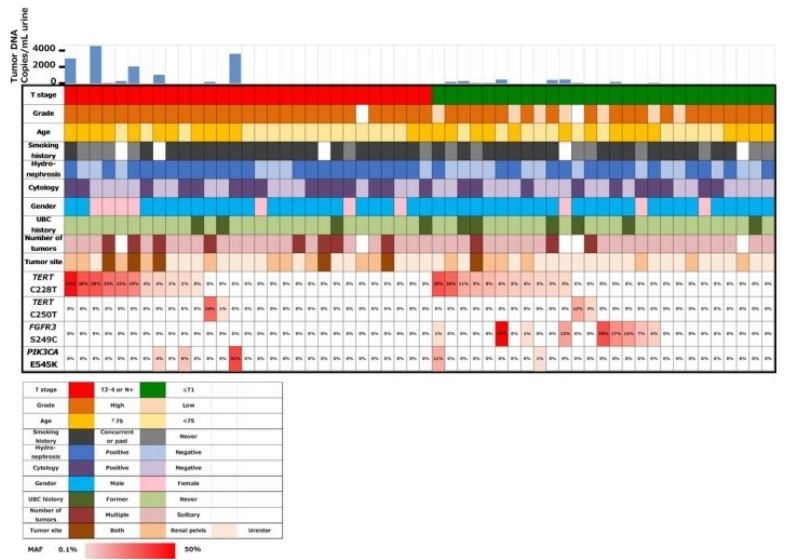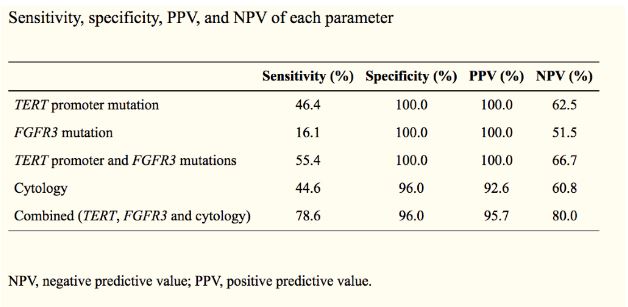Many have looked for urinary markers to detect disease, but urine cytology remains the only non-invasive marker that is standard of care, with a sensitivity as low as 40% for UTUC. Cell-free tumor DNA (cfDNA) represents a potential diagnostic tool and is shed into the urine along with DNA from normal cells. To that end, Hayashi et al, developed a droplet digital polymerase chain reaction (ddPCR) assay to evaluate ctDNA. Specifically, they looked at hotspot mutations of Telomerase Reverse Transcriptase (TERT) promoter and fibroblast growth factor receptor (FGFR3) to evaluate the diagnostic potential of urine supernatant cfDNA collected from patients with localized UTUC.
Their study cohort consisted of 56 UTUC patients, 50 patients with hematuria not caused by UC, 21 patients with no evidence of disease for at least one year after TURBT or RNU (surveillance cohort), and 26 healthy controls. Of the UTUC patients, TERT C228T mutations were identified in 22/56 (39.3%), TERT C250T mutations in 4/56 (7.1%), and FGFR3 S249C mutation in 9/56 (16.1%) patients. Even more impressively, the FGFR3 mutation was only found in non-muscle invasive cases (
These alterations in cfDNA were further assessed as a potential marker for the presence of UTUC. Using, cytology and cfDNA results from the UTUC patients compared to the hematuria cohort, they demonstrated an additive benefit to utilizing both mutations of the TERT promoter and FGFR3 in conjunction with cytology (sensitivity 78.6 and specificity 96.0%, table below).
Lastly, the authors looked at the prognostic utility of cfDNA. No significant difference was observed in prognosis (bladder recurrence‐free survival or overall survival) between TERT promoter mutation and wild type, however those with a high MAF of the TERT C228T mutation had shorter overall survival than those with low MAF (P = 0.040).
This report presents the results of a proof of concept study, which successfully demonstrated the ability to not just detect cfDNA from tumors in the urine of patients with UTUC but to also provide diagnostic and prognostic potential. The complete results of their abstract was published in Cancer Science in May of 2019.1


Alteration landscape of 56 upper tract urothelial carcinoma samples, combined with tumor stage, grade, age, smoking history, hydronephrosis, cytology, gender, urothelial bladder cancer (UBC) history, number of tumors, tumor site, and mutant allele frequency (MAF) of each mutation (Cancer Sci. 2019 May; 110(5): 1771–1779.)
Presented by: Yujiro Hayashi, MD, Department of Urology, Osaka University Graduate School of Medicine, Suita, Japan
Written by: Adrien Bernstein, MD, Society of Urologic Oncology Fellow, Fox Chase Cancer Center, Philadelphia, PA , at the 20th Annual Meeting of the Society of Urologic Oncology (SUO), December 4 - 6, 2019, Washington, DC
References:
1. Hayashi, Y., Fujita, K., Matsuzaki, K., Matsushita, M., Kawamura, N., & Koh, Y. et al. (2019). Diagnostic potential of TERT promoter and FGFR 3 mutations in urinary cell‐free DNA in upper tract urothelial carcinoma. _Cancer Science_, _110_(5), 1771-1779. doi: 10.1111/cas.14000


